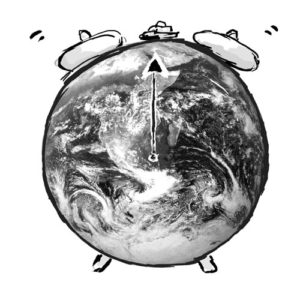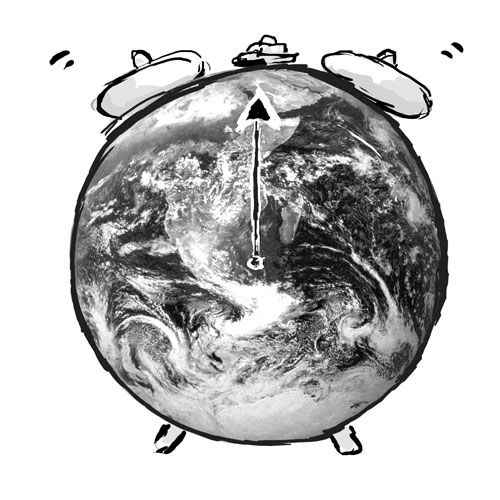save the world
Mark McKenzie
Contributor
Change is occurring, which is good. Any change is good. Our Earth is a wonder to behold. If only everyone saw it this way.
We produce energy from its purest form, burn it and use it to run our economically based society. The method of harnessing energy for public use is in itself dangerous, but the way it is generated by companies compounds the danger.
The term “base load” refers to the minimum amount of power that a company needs to give to its consumers. An electrical grid is one such medium from which the consumers receive their energy.

There are many forms of energy; however, for our purposes here, we will use electricity. The method of gathering resources for consumer use pollutes the environment first. A power plant runs on fuel. Imagine if there were no homes or businesses that needed electricity; that would mean these plants no longer need anything to burn, rendering them harmless to the environment. The extraction of some natural resources would come to a halt.
Right now you’re shaking your head as you read this and you’re saying: “There’s too much in it for companies to even care about alternative energy, or alternate anything.” That is true, but only to a certain degree. There is, as you probably know, much change happening. Along with this change, comes a new level of awareness about the problems being presented to the masses.
People do care. They will engage. A great example can be used to back up this claim. The world-famous “Earth Hour” is fast approaching, where millions of people across the world will turn off all electricity in their home from 8:30 p.m. to 9:30 p.m. March 26 in their respective time zones. Companies, families, and businesses all participate in this widespread environmental activity to slow down, if you will, the rate at which people generate and consume energy. Introduced in 2007 by Andy Ridley, Earth Hour’s co-founder and executive director, Earth Hour is regarded as a very important global movement. Conversely, some question wether it is necessary, what purpose it serves, and even then, will it make a difference in the minds of people who engage in the activity?
Denise Attallah, media relations specialist for Toronto Hydro thinks so. “When people turn off all power in their homes for an hour, it’s a big deal,” she says. “After Earth Hour last year, there was a drop rate of 10 percent for the usage rates in Toronto. That’s the equivalent of removing two hundred thousand homes off the grid.”
That’s a lot of energy saved. “This has nothing to do with any business profiting obviously. It is definitely a good platform to start on, and events such as this bring a lot of discussion to the table,” Attallah continues. “Promoting conservational activities act toward people, and affect their lives. It introduces new issues into the homes of everyday citizens. Like the use of CLS light bulbs, which are, of course, environmentally friendly.”
Earth Hour, and other such projects that work toward engaging the people, will stay with them after they have “put in their time,” so to speak. If they leave their heaters on during the day, leave their taps running, leave lights on for hours when they only need to open a window for sunlight to do the work, the worse off they will be, and they will notice this. The more people realize that they don’t need to use and use and waste, the less their hydro bill will be first of all and secondly, they’ll be helping the environment.
Everybody wins, constantly; winning’s fun, and losing sucks. To know whether or not people carry on the practice of conserving energy after the Earth Hour is a bit harder to realize. This is because, as Attallah points out, “It’s not like comparing apples to apples. It is difficult to say because the Earth Hour occurs on a time where there is space heating, we get warmer temperatures, so it’s hard to benchmark. In the summer time or close to it anyway, usage becomes less and less anyways, so it’s hard to gauge.”
In a way, the Earth Hour can be looked upon as a fresh start to a season where less energy needs to be consumed. The hopefully lowered bills people receive during the months that follow should be an indication of what they should hope to accomplish in the near future. “Even if it’s not in people’s minds after the fact, it has still provided the environment some leeway from pollution,” says Attallah. “Any conservational act is always, always worth it in the end. When groups such as World Wildlife Fund (WWF) raise awareness, it really does raise awareness. So it is not surprising how many people participate in Earth Hour.”
In the hour people take to turn off their electricity, they will automatically think about why they are doing it. It’s not for fun, it’s not something to be proud of, it’s not something to look back on as a memorable moment: it’s a problem. The environment needs wide-scale solutions and this is only scratching the surface.
The only way that this energy usage problem will be dealt with is if we all work together on it. This problem will not be solved overnight, and it most certainly will not be solved in an hour. Commitment is necessary.
As Attallah pointed out, spring and summer roll right around the corner shortly after Earth Hour, so progress is hard to map. We should, however, all be thinking of being committed to the environment nonetheless. With 128 countries and territories hosting this event, this shouldn’t be an event to simply forget and move on afterward. We should learn from the event(s) taking place.
This isn’t a game, this is something serious. Take care of your world, and it will take care of you.
Earth Hour is on Saturday, March 26th from 8:30pm to 9:30pm.
How will you get involved?
What Earth Hour does for your planet




